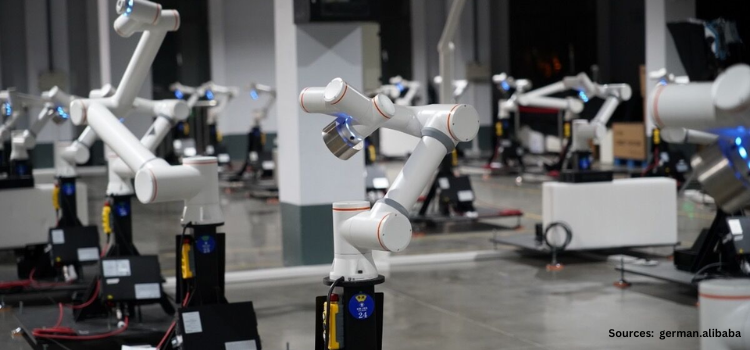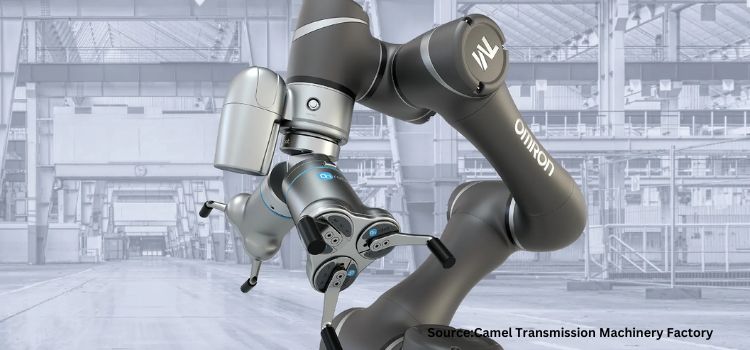
North America Warehouse Robotics Market by Type (Automated Guided Vehicles (AGVs), Autonomous Mobile Robots (AMRs), Articulated Robots, & Others), by Offering (Hardware, Software, and Services), by Payload Capacity (Less than 100 KG, 101-200 KG, 201-500 KG, and Others), by Application (Palletizing and Depalletizing, Sorting and Packaging, Picking and Placing, Transportation), and by End-Users – Opportunity Analysis and Industry Forecast, 2025–2030
Industry: Semiconductor & Electronics | Publish Date: 04-Apr-2025 | No of Pages: 174 | No. of Tables: 130 | No. of Figures: 75 | Format: PDF | Report Code : SE3164
North America Warehouse Robotics Market Overview
The North America Warehouse Robotics Market size was valued at USD 3.07 billion in 2024, and is predicted to reach USD 10.52 billion by 2030, at a CAGR of 21.7% from 2025 to 2030.In terms of volume, the market size was 140.63 thousand units in 2024 and is projected to reach 520.80 thousand units by 2030, with a CAGR of 23.1% from 2025 to 2030
The warehouse robotics market includes automated systems and robotics tools designed to regulate the flow of warehouse operations. The North America warehouse robotics industry is moving at a fast pace, driven by the increase in e-commerce and sales in automobiles.
However, due to higher deployment costs of robotics systems pose challenges to further growth across the region. The introduction of advanced technologies as such AI is anticipated to offer opportunities for the market. On the contrary, introduction of artificial intelligence in smart warehouse technology creates future options for the market.
E-Commerce Growth Helps Drive the North America Warehouse Robotics Market Demand
E-commerce growth propels market growth in warehouse robots due to greater demand for speed and efficiency in fulfilling orders. With growing online retail purchases, consumers and logistics providers increasingly want to apply robotic technologies in order to better handle volume orders, deliver quicker, and provide peak operating efficiency. Expansion in e-commerce activities accelerates usage of warehouse robotics and logistics, driving market growth.
Growth in Sale of Vehicles Propels the North America Warehouse Robotics Market Expansion
The demand for auto sales enhances the demand for automating manufacturing and supply chain functions. Labor needs to increase with more production to be fulfilled by auto companies, and robotic systems assist with material handling, inventory, and part distribution. This enhances operational accuracy, minimizes errors, and facilitates faster delivery systems, resulting in warehouse robots becoming critical in fulfilling the growing demands of the market.
The surge in growth generates the demand for sophisticated automation systems in warehouses to deal with a huge number of parts and components more effectively thus fueling market growth.
High Costs Involved in Deployment Hinders the North America Warehouse Robotics Market Growth
The increase in costs related in deploying warehouse robotics as advanced robotic systems, conveyor technologies, and complicated software solutions, present a hurdle for small and medium-sized enterprises (SMEs).
Lower financial resources prevent these businesses from investing in automation, restricting their ability to improve operational efficiency and remain competitive with larger market players. This financial hurdle impedes the industry growth by reducing adoption rates among smaller firms.
Introduction of Artificial Intelligence Creates Future Opportunity for the Market
The addition of artificial intelligence is expected to play a major role in allowing growth opportunity for the North America warehouse robotics market trends in the future.
AI-induced solutions improve decision making, optimize inventory management and improve the accuracy and speed of operations that helps warehouses to become more accurate and adaptable.
As such in January 2025, Nvidia disclosed new AI development tools aimed at improving the potential of autonomous robots and vehicles. These models are mad to create synthetic data and simulate physical interactions, allowing developers to create designed templates for testing their AI systems before real-world.
These progresses will focus on the transformative potential of AI in warehouse robotics, paving the way for smarter, more lively and highly efficient warehouse operations that meet the future demands of modern supply chains.
The U.S. Dominates the North America Warehouse Robotics Market Share
With the deployment of high numbers of industrial robots in America fuels the warehouse robotics sector because of the potential to maximize efficacy, precision, and scalability in warehouse functions. The robots function as automatic picking, sorting, and palletizing operations, minimizing labor reliance and workflow optimization in face of increasing demand by industries such as e-commerce, automotive, and manufacturing.
The recent World Robotics Report 2023 report states, the annual number of industrial robots installed in United States was 31 thousand in 2016 and in 2022 it was 40 thousand, indicating a growth of 29.0% over the period of 6 years. This increasing trend of industrial robot installations reflects the increased dependence on automation to fulfill operational needs, pushing innovation and growth in the warehouse robotics industry throughout the U.S.
Moreover, the emergence of top players such as FANAUC are involved in various business strategies such as business expansion and product launch results in the progress of the market across the region. As per, FANAUC America Corporation extended its business by unveiling new facility in U.S. that includes modernized product manufacturing and customized automation as well as warehouse space for more than 6000 quick delivery robots. This major expansion shows growth strategy in the U.S. and its unwavering commitment to the future of the automation and robotics industry.
Mexico to Witness Steady Growth in the North America Warehouse Robotics Industry
Mexico’s growth in the usage of industrial robots is increasing the North America warehouse robotics market expansion. These robots improve efficacy and work rate by automating tasks such as sorting, picking, and packing, reducing manual errors and optimizing workflows.
As per the World Robotics Report 2023, Mexico ranked at 9th position out of the 15 largest markets in 2022 where annual installation of industrial robots stood at 6000 units showing a growth rate of 13%.
Moreover, with the increase in sale of vehicles fuels the growth of robotics in supply chain to reduce the operational costs and improve safety that accelerates the adoption of warehouse robots such as automated guided vehicles and autonomous mobile robots.
According to the International Energy Agency report 2024, Mexico’s car sale increased to 1.2 million in 2023 from 844 thousand in 2020, showing a growth of 42.2%. This rise will help creating greater demand for equipment and parts, promoting technological advancement in production process and increases need for efficient logistics supply chain systems.
Competitive Landscape
The promising players operating in the North America warehouse robotics industry includes ABB Ltd., Omron Corporation, KUKA AG, Fanuc Corporation, JBT Corporation, Teradyne Inc., GreyOrange, Bastian Solutions, LLC, Geekplus Technology Co., Ltd., Zebra Technologies, Dematic, Locus Robotics, Honeywell International Inc, Vanderlande Industries B.V., Standard Bots.
North America Warehouse Robotics Market Key Segments
By Type
-
AGVs
-
AMRs
-
Articulated Robots
-
Others
By Offering
-
Hardware
-
Software
-
Services
By Payload capacity
-
Less than 100 kg
-
101-200 KG
-
201-500 KG
-
Others
By Application
-
Palletizing and Depalletizing
-
Sorting and Packaging
-
Picking and Placing
-
Transportation
By End User
-
E-commerce
-
Automotive
-
Food & Beverages
-
Others
By Country
-
U.S.
-
Canada
-
Mexico
Key Players
-
ABB Ltd.
-
Omron Corporation
-
KUKA AG
-
Fanuc Corporation
-
JBT Corporation
-
Teradyne Inc.
-
GreyOrange,
-
Bastian Solutions, LLC,
-
Geekplus Technology Co., Ltd.
-
Zebra Technologies
-
Dematic
-
Locus Robotics.
-
Honeywell International Inc.
-
Vanderlande Industries B.V.
-
Standard Bots.
REPORT SCOPE AND SEGMENTATION:
|
Parameters |
Details |
|
Market Size Value in 2024 |
USD 3.07 billion |
|
Revenue Forecast in 2030 |
USD 10.52 billion |
|
Value Growth Rate |
CAGR of 21.7% from 2025 to 2030 |
|
Market Volume in 2024 |
140.63 thousand units |
|
Volume Forecast in 2030 |
520.80 thousand units |
|
Growth Rate (Volume) |
CAGR of 23.1% from 2025 to 2030 |
|
Analysis Period |
2024–2030 |
|
Base Year Considered |
2024 |
|
Forecast Period |
2025–2030 |
|
Market Size Estimation |
Billion (USD) |
|
Market Volume Estimation |
Thousand units |
|
Growth Factors |
|
|
Companies Profiled |
15 |
|
Market Share |
Available for 10 companies |
|
Countries Covered |
3 |
|
Customization Scope |
Free customization (equivalent up to 80 working hours of analysts) after purchase. Addition or alteration to country, regional, and segment scope. |
|
Pricing and Purchase Options |
Avail customized purchase options to meet your exact research needs. |

















 Speak to Our Analyst
Speak to Our Analyst





















